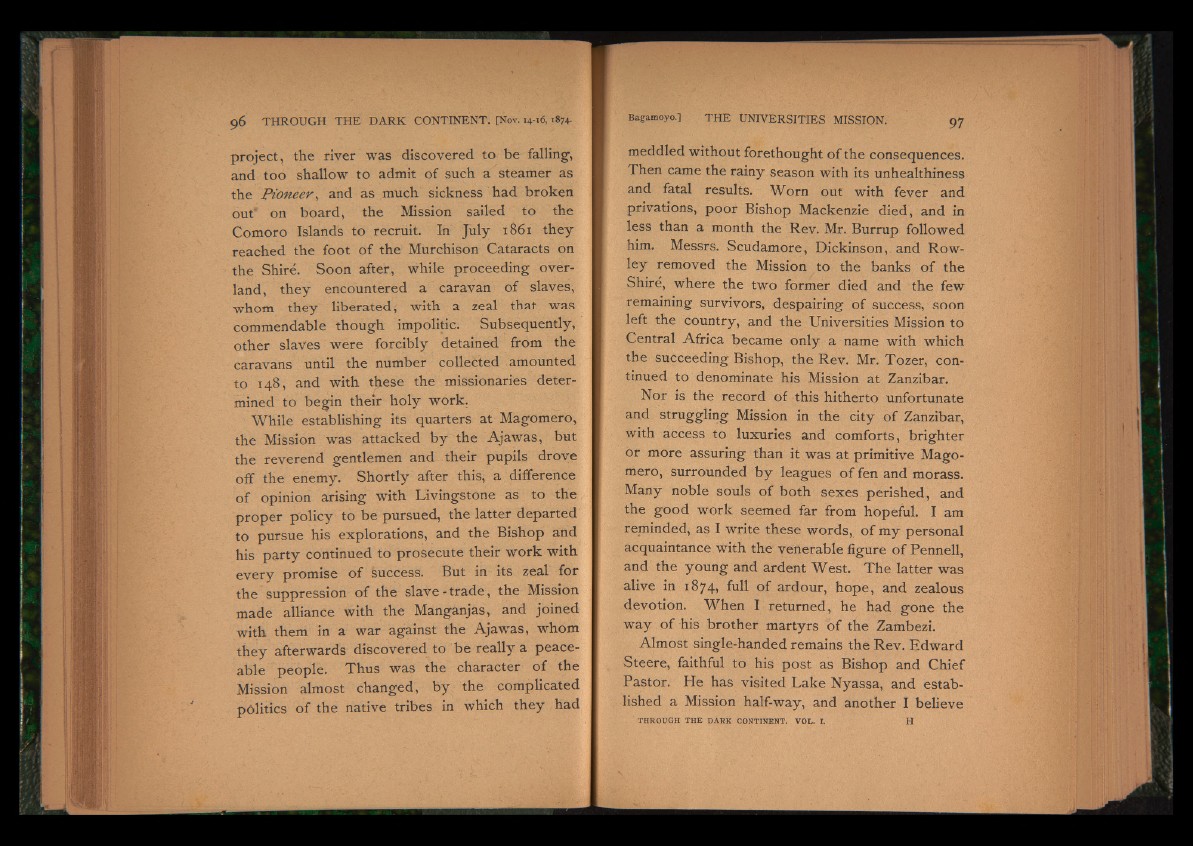
project, the river was discovered to be falling,
and too shallow to admit of such a steamer as
the P io n eer, and as much sickness had broken
out* on board, the Mission sailed to the
Comoro Islands to recruit. In July 1861 they
reached the foot o f the Murchison Cataracts on
the Shire. Soon after, while proceeding overland,
th ey encountered a caravan o f slaves,
whom th ey liberated, with a zeal that was
commendable though impolitic. Subsequently,
other slaves were forcibly detained from the
caravans until the number collected amounted
to 148, and with these the missionaries determined
to begin their h o ly work.
While establishing its quarters at Magomero,
the Mission was attacked b y the Ajawas, but
the reverend gentlemen and their pupils drove
off the enemy. S h o r tly after this, a difference
o f opinion arising with Livingstone as to the
proper p o licy to be pursued, the latter departed
to pursue his explorations, and the Bishop and
his party continued to prosecute their work with
e v e ry promise o f success. But in its zeal for
the suppression o f the s la v e -trad e , the Mission
made alliance with the Manganjas, and joined
with them in a war against the Ajawas, whom
th ey afterwards discovered to be really a peaceable
people. Thus was the character o f the
Mission almost changed, b y the complicated
pblitics o f the native tribes in which they had
meddled without forethought o f the consequences.
Then came the rainy season with its unhealthiness
and fatal results. Worn out with fever and
privations, poor Bishop Mackenzie died, and in
less than a month the Rev. Mr. Burrup followed
him. Messrs. Scudamore, Dickinson, and R ow le
y removed the Mission to the banks o f the
Shire, where the two former died and the few
remaining survivors, despairing of success, soon
left the country, and the Universities Mission to
Central Africa became only a name with which
the succeeding Bishop, the Rev. Mr. Tozer, continued
to denominate his Mission at Zanzibar.
Nor is the record of this hitherto unfortunate
and struggling Mission in the city o f Zanzibar,
with access to luxuries and comforts, brighter
or more assuring than it was at primitive Magomero,
surrounded b y leagues o f fen and morass.
Many noble souls o f both sexes perished, and
the good work seemed far from hopeful. I am
reminded, as I write these words, o f my personal
acquaintance with the venerable figure o f Pennell,
and the young and ardent West. The latter was
alive in 1874, full o f ardour, hope, and zealous
devotion. When I returned, he had gone the
w a y o f his brother martyrs o f the Zambezi.
Almost single-handed remains the Rev. Edward
Steere, faithful to his post as Bishop and Chief
Pastor. He has visited Lake Nyassa, and established
a Mission half-way, and another I believe
THROUGH THE DARK CONTINENT. VOL. I. H